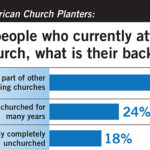Payday loan outlets have grown like kudzu in recent years. Texas has more payday lender outlets—about 3,000—than it has McDonald’s and Whataburger restaurants combined.
And some churches and pastors are asking how they can equip people living in poverty—as well as members of their own congregations—to make decisions regarding payday lenders.
Teach biblical principles about money
Joseph Parker, pastor of David Chapel Missionary Baptist Church in Austin and an attorney, insists the first step is to have an open conversation about personal financial practices—and realize the Bible speaks on money.

Haitian women have begun a micro-credit loan program to help them establish small businesses to lift them out of poverty. (PHOTOS/Courtesy of Mission Waco)
|
“There are people who don’t know what the Bible says about money and financial principles,” Parker said. “So, we have to equip the people and tug at them through what the Bible says. It will help them filter daily decisions through the mandates of Scripture.”
Many Scriptures—particularly in the law and the prophets of the Old Testament—speak against practices similar to those used by payday lenders.
Payday loans are small-dollar loans with high service fees and interest rates that offer instant cash with no credit check. Since the borrower typically is required to pay off the loan in full at the end of two weeks, payday loans often can create a cycle of debt. In this cycle, fees and interest rates can reach the equivalent of up to 500 percent APR.
Many payday loan users already struggle to make ends meet. A recent survey conducted by Texas Appleseed, an advocacy group for low-income families, showed most payday loan borrowers earned $30,000 or less income and used the loan for recurring expenses of basic needs like rent, utilities and food.
Sign up for our weekly edition and get all our headlines in your inbox on Thursdays
In addition to Bible studies, churches can offer financial education programs such as Money Smart—sponsored by the FDIC—to explain how to budget income to become better stewards of money while avoiding the predatory practices of payday lenders. Education brings economic empowerment, Parker observed.
“Those living in poverty might think that high interest is just part of their lives unless they have a sense of empowerment,” he said. The message is more than dollars and cents.
“The church can embrace this idea about economic empowerment and teach people how they should manage their money and how they should be treated.”
Learn from global examples
But financial education is not the only answer. It is difficult to tell someone not to use a payday loan when it is the only option, Parker noted.
“The loan is born out of desperation,” he said. “Without having a reasonable answer, what do you do? It’s hard to tell people that are poor not to use payday loans without having some other alternative to meet their needs. Without filling the need, it becomes an intellectual conversation.”
Churches have supported organizations around the world that fill the need for credit through microlending. Microcredit organizations, like the Grameen Bank and the Institute for Integrated Rural Development, extend small loans to people living in poverty in countries outside the United States. These loans are used for self-employment projects that generate income, allowing people to care for themselves and their families.
For example in Bangladesh, IIRD gives small loans to women to buy silkworms for producing raw silk. After the silk is produced, women sell their product to other women who own looms, many of which were bought with microloans as well. Microloans are paid back with reasonable interest and include certain requirements that involve the borrower and lender sitting down and deciding what’s best for the borrower.
The Grameen Bank, for instance, requires lenders to make 16 decisions that will improve their own future as well as their family and community’s future. Among these 16 decisions are the statements: “We shall educate our children and ensure that they can earn to pay for their education,” and “We shall always be ready to help each other. If anyone is in difficulty, we shall all help him or her.”
Aaron Tyler, an ordained Baptist minister and chair of the Graduate International Relations Department at St. Mary’s University, explains that microlending helps to lift people out of poverty.
“Microlending and other sustainable development projects facilitate a person’s own creative approaches,” Tyler explained. “This participatory approach to development encourages proactive listening and a better understanding of the local community and culture.”
Some advocates for payday loans say they are the only option for struggling families in Texas and throughout the United States. Like microlending, payday lenders can help people during difficult financial times. Both provide small loans to people who need money quickly.
However, Tyler points out, payday loans and microlending are fundamentally different.
“A primary distinction is the motivation,” he said. “Microlending can encourage a mutual respect and accountability. Payday lending is not designed to eradicate poverty. Instead, it can exploit poverty.”
Consider the role of regulation
Some payday lenders exploit the poor by bypassing existing state regulations. The Texas Finance Code sets some restrictions on small-dollar loans to create a healthy market. However, most payday lenders operate as consumer service organizations, avoiding licensing and regulation by the office of consumer credit commissioner. In the most recent Texas legislative session, several bills were proposed to bring consumer service organizations under the regulation of the consumer credit commissioner’s office, but none was passed into law.
Opponents of tighter regulation claim restrictions on payday lenders are harmful to a free market. They say the market will set reasonable interest rates and consumers are best equipped to make decisions about credit for themselves. They insist the best way to protect consumers is to allow for a competitive and healthy short-term lending market.
Others maintain a healthy market includes moral restraint. In an online article posted on his website last summer, Dave Ramsey applauded legislation in Arkansas that shut down payday lending businesses. Ramsey, a financial adviser and author of Financial Peace, explained such legislation illustrated moral restraint. He used an illustration by Michael Novak, former U.S. ambassador and author of The Spirit of Democratic Capitalism, to make his point.
“Michael Novak says our economy rests on a three-legged stool comprised of political freedom, economic freedom and moral restraint,” Ramsey explained. “Without any of these three ‘legs,’ the economy—as we know it—collapses. …
“In this instance, payday lenders had no moral restraint. They commonly took advantage of lower-class people by charging outrageous interest rates. So the government had to step in and pass laws to keep these predators from operating. Capitalism without moral restraint is anarchy.”
Some Texas cities have taken it upon themselves to exhibit moral restraint through tighter regulation. In December, Brownsville placed a six-month moratorium barring new payday lenders from opening any new stores in town. A recent article from Daily Finance quoted Mayor Pat Ahumada as saying, “Our most vulnerable citizens are easy prey for these legal loan sharks, and we want to protect our citizens by regulating them.”
Brownsville has joined a half-dozen other Texas communities—Irving, Mesquite, Sachse, Richardson, Garland and Little Elm—that also have sought restrictions for payday lenders—most having passed zoning laws preventing the payday-lending industry from expanding into new locations.
In the same Daily Finance article, Mesquite Mayor John Monaco said, “Any business that depends on people who are desperate and preys on them has no place in my community.”
Create constructive alternatives
Some organizations have created alternatives to payday loans. West End Neighborhood House in Delaware has produced Loans Plus to help those families who would normally use a payday loan. Loans Plus offers small-dollar loans that function similarly to payday loans in that borrowers use the same documentation to qualify and cash is received the same day. However, Loans Plus interest is only between 12 and 15 percent.
To receive a loan, customers fill out a spreadsheet with an adviser to establish a budget and determine how much money they should borrow—an exercise in financial education. Loans Plus offers no roll-over payment plans. Instead, payment plans of up to 3 months are offered.
Loans Plus has a 70 percent approval rate for loans. Customers who are not approved for loans are directed to crisis help. The Loans Plus product provides a way for people to get out of crisis rather than perpetuate a cycle of debt.
Several Texas nonprofit organizations, working in partnership with credit unions and banks, are in the early stages of developing similar alternatives to payday loans. While few are available yet, there is hope that small-dollar loan products for struggling families will be available in the next few months.
“Parishes and churches are beginning to ask themselves, ‘How do we proactively offer alternatives to payday loans?’” Tyler of St. Mary’s University noted. “This is an ideal place for churches to be involved. Christians and churches offer a humane way of contributing to the conversation.”
Amy Wiles is a member of First Baptist Church in Austin and a student at Austin Presbyterian Theological Seminary who plans to graduate with her Master of Divinity degree in May 2011. Before entering seminary, she taught music in public schools five years, after completing her undergraduate degree at Baylor University in Waco. She is serving a public policy research internship jointly sponsored by the Texas Baptist Christian Life Commission and the Baptist Standard, made possible by a grant from the Christ is Our Salvation Foundation of Waco.













We seek to connect God’s story and God’s people around the world. To learn more about God’s story, click here.
Send comments and feedback to Eric Black, our editor. For comments to be published, please specify “letter to the editor.” Maximum length for publication is 300 words.